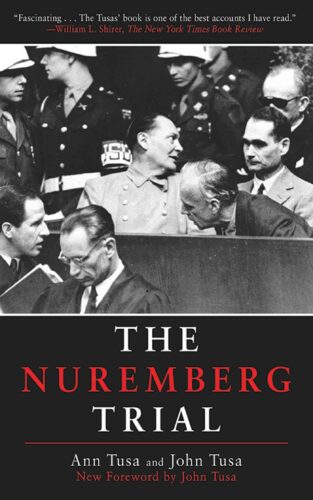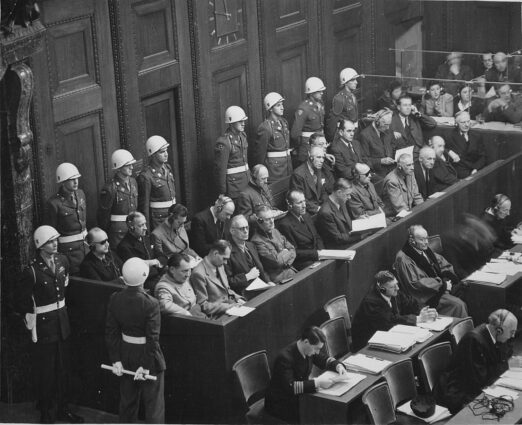 A Surprisingly Dull Treaties on International Law
A Surprisingly Dull Treaties on International Law
Authors: Ann & John Tusa
Ann and John Tusa teamed together to create The Nuremberg Trial, a five-hundred-page opus covering the literal trial of the century where multiple nations gathered together, post-World War II, to decide the fate of the remaining Nazi leaders. In this international quest for justice, England, America, France, and the former USSR struggled with issues of vengeance, with perceived “victor’s justice,” with fairness and legality, and with establishing a new precedent for international law. Together, these nations participated in a yearlong trial of 22 defendants, including the infamous Hermann Göring.
What proceeds is a surprisingly dull exercise in bureaucracy that is just as vital for history and law as it is ultimately stultifying for readers. It begins, not with the horrors of war, but with theory and internal bickering. Each nation had its own reasons for participating, some more honorable than others. These reasons morph into diatribes about existing laws, precedents, and theory in the face of what is undeniable monstrosity and carnage. Obviously, the development of international laws and codes must be essentially pragmatic, cool-headed, rational, striving for fairness while working across drastically different legal systems, yet the Tusa’s intro is far too in-the-weeds, and readers soon feel the tedium of indecisive bureaucrats postulating and failing to conceal their own political agendas.
The tedium continues once the laws – admittedly the first of their kind – are finally set and the trial begins. The participating nations represent their cases differently and there are endless, endless arguments over the American’s insistence on “intent to conspiracy” as a charge. This is a fight that interrupts the action (i.e., the occasional reading of documents in court) and sets the unstructured narrative off on repetitive tangents. Historians will undoubtedly see quality here, but casual readers dipping their toes into historical reading will be both overwhelmed and ashamedly bored. It does not get better.
It soon becomes impossible to remember all the of defendants, the different prosecutors, the judges, and the witnesses. The Nuremberg Trial becomes a mélange of court-like transcripts with surprisingly rare details. The horrors of the war are boiled down into legalese and into discussions about how much Nazi leadership was accountable for the crimes and atrocities that they masterminded but did not personally commit. Again, its an interesting discussion about responsibility and culpability, but it becomes mired in dull repetition and documented factoids that are impossible to remember, must less attribute to individual persons.
This goes on, more or less, for five hundred odd pages. The authors mostly skip over the accusations, summing them up – planning war, invasion, ordering death, genocide, etc. – and move straight to the legalese and ramifications, making this a great case study for future lawyers and a nearly impenetrable presentation for your average citizen and newbie history aficionado.
The conclusion ends with the executions, which are themselves breezed over. This isn’t about the people concerned, but about the law, the layout of a first-of-its-kind trial, and the international repercussions and relationships among nations. It’s a great resource for someone who wants to deep-dive on the layout of the trial and the creation of the laws, but the actions of the defendants are so buried, and there are so many key players, that’s it is impossible to come away with anything beyond a high level, big picture overview of leaders, some of whom seemed to feel some regret and many others who continued to lie and justify.
For me, despite the quality of the research and its thoroughness, The Nuremburg Trial was too long and too concerned with minute legalese to be new-reader friendly. I found it shockingly dull. It was a true feat to finish this work, and what I learned would have better benefited me in a not-for-experts book (or even a Wikipedia page) that gave an overview of the big-ticket issues and creation of these international laws and approaches to war crimes. I think that presentation would have been more impactful and ultimately more memorable. As it is, this was a true struggle to read, and I was relieved to finally be finished with it.
– Frances Carden
Follow my reviews on Twitter at: https://twitter.com/xombie_mistress
Follow my reviews on Facebook at: https://www.facebook.com/FrancesReviews
- Book Vs Movie: The Shining - April 6, 2020
- Thankful For Great Cozy Mysteries - December 13, 2019
- Cozy Mysteries for a Perfect Fall - October 20, 2019




